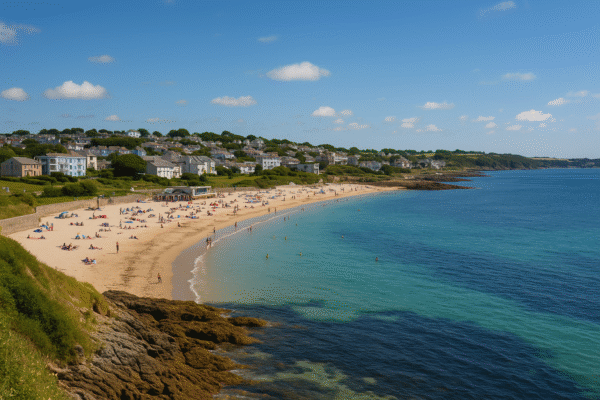Falmouth, the scenic Cornish town once dismissed in a controversial online survey as “the most depressing town in the UK,” has made a powerful comeback. In 2025, it has not only shed its negative image but has been officially recognised as the best seaside town to live in the UK. This accolade marks a significant milestone in a story of community resilience, smart planning, and sustainable tourism that has caught the attention of the entire country.
Nestled on the south coast of Cornwall, Falmouth has long been known for its deep natural harbour, golden beaches such as Gyllyngvase, Swanpool, and Castle Beach, and vibrant maritime history. But it’s the town’s recent transformation—from misjudged to most desired—that’s inspiring both tourists and policymakers alike.
From Misunderstood to Model Coastal Destination
Back in 2024, an independent online survey stirred controversy by ranking Falmouth at the bottom of UK seaside towns due to perceptions of being “boring” and “bland.” The backlash from residents, students, and business owners was swift and united. Mayor Kirstie Edwards defended the town with grace, highlighting Falmouth’s commitment to sustainability, community involvement, and arts-led regeneration.
Fast forward to 2025, and those very qualities are what have propelled Falmouth to national prominence. The UK Office for National Statistics and Visit Cornwall report that Cornwall’s tourism sector saw a 14% rise in revenue in early 2025 compared to the previous year, with Falmouth at the forefront of this growth.
Tourism Growth Fuelled by Eco-Conscious Travel
With eco-tourism now a defining trend, Falmouth has seized the moment. The town’s focus on zero-waste retail, eco-sailing excursions, cycling infrastructure, and marine conservation initiatives has drawn thousands of new visitors, particularly families and retirees seeking responsible coastal escapes.
Boutique hotels near the seafront, small cafés, and art galleries have seen a surge in business. Marine heritage centres and local tour operators have reported record spring and summer footfall, and festivals such as the Falmouth International Sea Shanty Festival and Seaweed Festival have only added to the cultural buzz.
A Lifestyle Destination for Remote Workers and Creatives
Falmouth’s newfound popularity is not limited to tourism. A recent South West England quality of life index places Falmouth among the highest-ranking towns in the region. Factors considered include average weekly income, air quality, access to cultural spaces, green areas, and traffic-free living.
Estate agents confirm that housing demand remains strong year-round, boosted by remote workers, freelancers, and graduates attracted by proximity to Falmouth University and the University of Exeter’s Penryn Campus. The town’s investment in digital infrastructure, including high-speed broadband and coworking spaces, has also made it an appealing choice for the digital nomad generation.
Community Spirit and Coastal Culture at Its Core
Behind the transformation is a strong community ethos. Local campaigns such as Plastic Free Falmouth have mobilized businesses and schools to combat marine pollution. Community gardens, coastal clean-ups, and regular town hall forums have empowered residents to shape Falmouth’s future.
Gyllyngvase Beach, once criticised as “underwhelming,” now ranks as one of the UK’s top hidden gems for wild swimming and paddleboarding. This growing popularity has brought renewed investment in beach facilities, lifeguard services, and seafront hospitality, all of which contribute to the local economy.
Ripple Effects Across Cornwall and the UK
Falmouth’s success is being felt beyond its borders. Nearby coastal towns like Penzance, St Ives, and Bude are experiencing increased property searches and visitor numbers, with councils studying Falmouth’s regeneration model. National tourism authorities, including the Department for Digital, Culture, Media & Sport, have cited Falmouth as a case study in coastal regeneration and community-led planning.
As climate change and urban migration put pressure on rural and seaside towns, Falmouth offers a rare example of how visionary leadership, heritage preservation, and sustainable tourism can work in harmony.
Looking Ahead: A Town Rooted in Values, Ready for the Future
Despite the accolades, Falmouth remains grounded. “We’ve never set out to be flashy,” says one local café owner. “We just focus on being welcoming, taking care of our home, and doing things the right way. The rest follows.”
Visitors agree. Whether strolling along the South West Coast Path, exploring the National Maritime Museum Cornwall, or enjoying fresh seafood by the quay, the atmosphere is one of understated charm and deep community pride.
Conclusion: Falmouth’s Coastal Renaissance Is Here to Stay
Falmouth’s journey from unjust criticism to coastal crown jewel is more than a redemption arc—it’s a blueprint for how towns can thrive in the 21st century. For travellers seeking meaningful experiences, families dreaming of scenic living, or professionals craving balance, Falmouth offers something deeper than postcard beauty: it offers purpose, pride, and permanence.
As the town welcomes a new wave of admiration, it does so with its values intact—rooted in community, lifted by culture, and looking firmly toward a sustainable future. Falmouth isn’t just the best seaside town to live in 2025—it’s a symbol of what’s possible when a place believes in itself.
For more travel news like this, keep reading Global Travel Wire



















